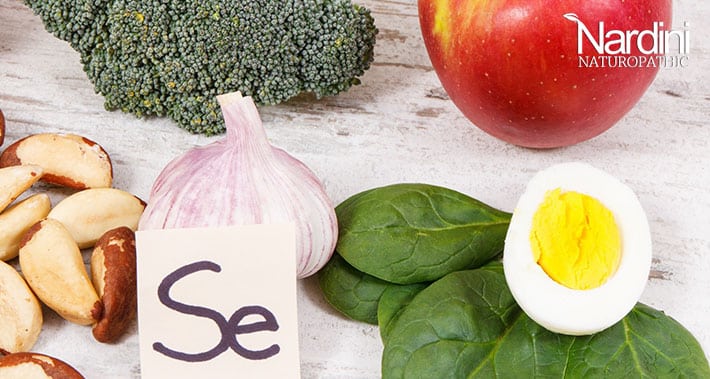It’s essential for your health and wellbeing that your thyroid gland functions as it should.
When your thyroid hormone levels are out of whack, it affects your entire body.
Hypothyroidism is a relatively common condition that impacts millions of people across the globe.
There are various treatment options for hypothyroidism.
A key part of dealing with this condition and mitigating symptoms is your diet.
The right combination of nutrients can have a big impact on the health of your thyroid gland and, by extension, your overall health.
Let’s dive into nutrition for hypothyroidism and look at the key vitamins and minerals you should make sure to include in your diet, from a naturopathic doctor‘s perspective.
What Is Your Thyroid?
Your thyroid is a small butterfly-shaped gland located near the base of your neck and is part of your endocrine system.
The main purpose of your thyroid gland is to create thyroid hormones, which have a wide variety of functions inside your body.
Your thyroid knows to secrete hormones into your bloodstream when it receives a chemical signal known as TSH, or thyroid-stimulating hormone.
TSH is sent from your pituitary gland, which is located at the base of your brain.
Thyroid hormones play an essential role in maintaining your heart rate, digestion, mood, metabolism, muscle control, and bone maintenance, among others.
What Is Hypothyroidism?
Hypothyroidism is a condition in which your body under-produces thyroid hormones.
There are two types of this condition: primary and secondary hypothyroidism.
Primary hypothyroidism occurs when your thyroid gland doesn’t release thyroid hormones like it should, even when adequate TSH is present.
This kind of hypothyroidism can be caused by a number of factors, including iodine deficiency, genetic disorders, certain medications, and thyroid surgery.
Around 90% of individuals with primary hypothyroidism experience this condition as a result of an autoimmune disease called Hashimoto’s thyroiditis.
Secondary hypothyroidism occurs due to a lack of TSH, which is an issue with the pituitary gland’s function.
Due to the multiple crucial functions of thyroid hormones, the signs and symptoms of this condition affect numerous systems of your body.
Symptoms of hypothyroidism include:
- Chronic fatigue
- Dry skin
- Weight gain
- Increased cold sensitivity
- Muscle weakness, aches, stiffness, and tenderness
- Slow heart rate
- Elevated blood cholesterol
- Irregular menstruation
- Enlarged thyroid gland
Can Nutrition Help With Hypothyroidism?
Proper nutrition is an important part of dealing with hypothyroidism.
Certain nutrients are essential for thyroid hormone production and the overall health of your thyroid gland.
Nutrients You Need
Ensuring proper nutrition when you have hypothyroidism takes a bit more than just a multi-vitamin.
Let’s look at some of the vitamins and minerals your body needs to support proper thyroid hormone production.
The following nutrients are best found through dietary means rather than supplementation, unless advised and monitored by a health professional.
1. Selenium
Selenium is an essential nutrient and an antioxidant, meaning it fights oxidative stress and helps protect your thyroid gland from cell damage.
Basically, selenium helps to “activate” thyroid hormones, making them useable by your body.
Dietary Sources Of Selenium
There are many nutritious foods that contain selenium.
Foods high in this essential mineral include:
- Fatty fish such as tuna and sardines
- Eggs
- Brazil nuts
- Legumes
2. Zinc
Zinc serves a similar purpose to selenium, which is to make thyroid hormones available to be used by your body.
This mineral may also help your body regulate TSH.
Dietary Sources Of Zinc
Here are some zinc-rich foods you may incorporate into your diet:
- Shellfish such as oysters and mussels
- Chicken
- Beef
- Whole grains
3. Iodine
As mentioned above, iodine deficiency can be a cause of primary hypothyroidism.
This is because iodine is essential for thyroid hormone production.
Many studies document the relationship between iodine deficiency and hypothyroidism, showing that insufficient amounts of iodine in the body are known to cause this condition.
Iodine deficiency is relatively common and affects around one-third of the global population; however, it’s less common in North America due to iodine-enriched salt and seafood.
Dietary Sources Of Iodine
Seafood, seaweed, dairy, and eggs all contain high levels of iodine.
Iodized salt, obviously, contains iodine as well.
However, iodized salt tends to contain flow agents and other additives that aren’t good for you, so I don’t recommend it.
Foods You Should Avoid
As there are nutrients you should aim to consume, there are also those with the potential to exacerbate hypothyroidism.
Goitrogens are compounds that get their name from “goiter”, the term for an enlarged thyroid gland.
They interfere with your thyroid gland’s ability to function properly.
If you have hypothyroidism, consider minimizing intake of the following goitrogen-containing foods:
- Soybean based products such as tempeh, tofu, and edamame
- Fruits and starchy plants such as peaches, sweet potatoes, strawberries
Concern exists that cruciferous vegetables, like kale, cabbage, and cauliflower, may be goitrogenic.
However, moderate amounts of these foods don’t tend to be an issue unless you have an iodine deficiency.
If you’re concerned about including these foods in your diet, talk to your naturopathic doctor or other medical professional for their input.
Other than goitrogens, it is best for individuals with hypothyroidism to avoid high-calorie processed foods.
Book An Appointment With Nardini Naturopathic
Dealing with a condition that affects your thyroid hormones can leave you tired, uncomfortable, and not sure where to turn.
However, there are natural solutions to help you deal with symptoms and improve your overall quality of life.
For more information on naturopathic treatments for hypothyroidism, contact me, Dr. Pat Nardini, at Nardini Naturopathic.
I am a naturopath in Toronto with a special focus on thyroid conditions.
If you’re dealing with a thyroid disorder such as hypothyroidism, I would love to work with you on a natural treatment plan that works for you and your body.
Book an appointment with Nardini Naturopathic today.
If you have questions about naturopathic medicine, or you’d like to take your first step into the world of naturopathy, contact us at Nardini Naturopathic, and let’s book an appointment.
Yours in health,
Dr. Pat Nardini, Naturopathic Doctor
320 Danforth Ave suite 206,
Toronto, ON, M4K 1N8
-https://g.page/NardiniNaturopathicDanforth
Dr. Pat Nardini, ND is a licensed doctor of naturopathic medicine in Toronto, Ontario. He offers science based natural health solutions with a special focus on thyroid conditions.

